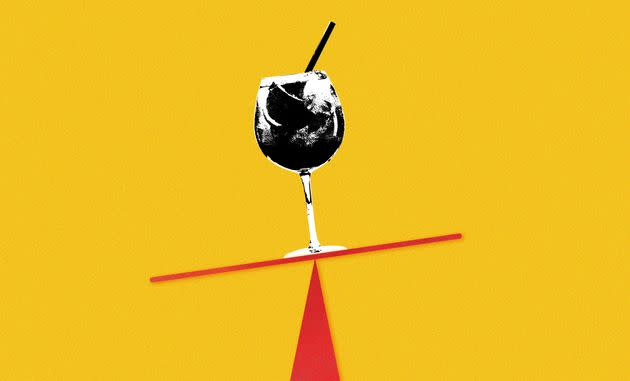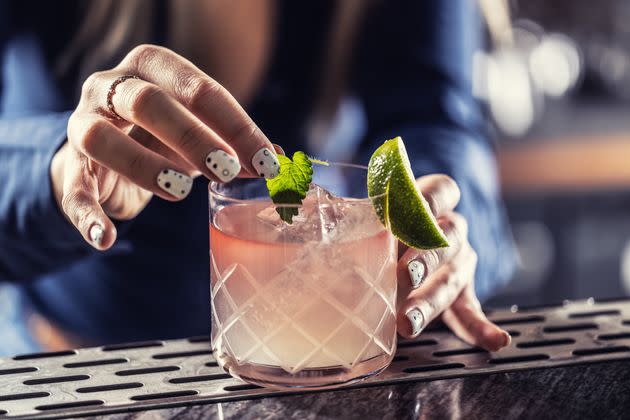
More and more people are swapping their boozy cocktails and full-bodied wines for non-alcoholic options, as evidenced by the proliferation of non-alcoholic drinks and sober bars around the world. According to a 2023 Gallup poll, 62% of adults under the age of 35 drink, up from 72% in 2003. But that same poll found that adults 55 and older are actually drinking more now than they did 20 years ago, making it clear that not everyone is on the same page when it comes to alcohol.
It’s easy to get confused about the dangers and benefits of alcohol. For years, headlines claimed that red wine was good for heart health (it’s not – the data ‘proved’ this was flawed), while societal norms seemingly make it okay to ask someone why they don’t drink (again, that’s not the case). Plus, having a drink with a friend is a way many people connect with their loved ones, and research shows that community is important. More recently, however, it has been shown that alcohol is actually very harmful to our health. It is categorized by the International Agency for Research on Cancer as a Group 1 carcinogen, meaning it is known to cause cancer.
Suffice it to say, due to societal norms and evolving research, our relationship with alcohol is understandably complicated. Now that you are more aware of this, it is only natural to think about your relationship with it. Is it okay to drink? Do you drink too much?
These considerations are very personal and there is no one-size-fits-all answer for everyone. But addiction therapists and recovery experts say there are some facts and guidelines you can keep in mind when considering your relationship with alcohol. Here’s what they are:
First, understand that alcohol is harmful to your health, no matter how much you drink.
The idea of a “healthy relationship” with alcohol is interesting, said Dr. John Kelly, director of the Massachusetts General Hospital Recovery Research Institute. “You could call it a ‘healthier’ relationship with alcohol, but alcohol carries risks even at very low levels, so it just depends on how much risk you want to take.”
“Alcohol causes damage through three different routes,” Kelly said. “One is through what we normally think of culturally as addiction… but you have two other routes: one is of course intoxication, which is independent of addiction – people get drunk, have low-level psychological impairment. [of alcohol consumption]. The third pathway is toxicity, something we don’t often think about, and that is cancer risk, liver disease and other types of risks.”
And those aren’t the only known problems, says Dr. Emily Hartwell, assistant professor of psychiatry at the University of Pennsylvania’s Perelman School of Medicine. It can cause cardiovascular problems, increase the risk of stroke and compromise your immune system. Drinking also changes your mental health.
“Alcohol affects a lot of different neurotransmitter systems in your brain – GABA and glutamate and serotonin and dopamine and a whole bunch of others,” Hartwell said.
Unlike many other drugs, alcohol affects many different areas that control how our bodies and brains function, she said. So if someone prone to depression drinks heavily, it will aggravate a number of systems in their body, Hartwell explained.
Even if you’re not struggling with depression or another mental health condition, alcohol still affects how you feel and can increase whatever feeling you’re trying to suppress, whether it’s stress, anxiety, or sadness.
“If someone drinks alcohol because it relaxes them… and then you stop drinking it later, when alcohol is no longer in your system, the opposite will actually happen,” Hartwell said. You may experience anxiety, panic, sadness, or other emotional symptoms.
If you do drink, you must adhere to the guidelines.
There is no such thing as risk-free drinking, Kelly said, but the National Institute on Alcohol Abuse and Alcoholism defines low-risk drinking as no more than seven drinks per week or three drinks in a day for women and no more than 14 drinks per week . drinks per week or four drinks in one day for men. For all people over 65, the guidelines say no more than seven drinks per week and three per day.
These guidelines “lower your risk, but don’t completely eliminate the risk because … you are exposing yourself to a level one carcinogen,” Kelly said.
This doesn’t mean you can’t choose to drink, Kelly said, “but just be informed about your risk, just like with everything else we do.”
“We drive fast, we eat bad food, we do things that are bad for us, but we know we’re doing it,” Kelly said. “We know that certain foods increase the risk of cancer, but we are not misled by that. The alcohol industry has duped the public. It is allowed to mislead or amplify disinformation for their profits, but it is not in the interest of public health.”
“It’s informed consent, right? That’s my goal here,” Hartwell said. “People, I think, are still going to drink. We can tell people all the scary information, all the statistics, until we’re blue in the face. People still continue to drink.”
If you weigh the pros and cons and decide that you still want to drink that cold beer or cozy up by the fireplace with a glass of wine, that’s your decision – as long as your eyes are open to all the effects that come with it. alcohol can have on your body. your body.


There are warning signs that you have an unhealthy relationship with alcohol.
The first sign is that you are using alcohol to cope with situations in your life. Alcohol “can easily become a problem if it becomes a primary way of dealing with anxiety, of dealing with conflict, because alcohol is essentially a depressant,” says Johanna Jones, a licensed professor-counselor at Thriveworks in Blacksburg, Virginia.
“If it becomes something that we use for a specific emotional purpose – to overcome anxiety, to let go of the worries of the day, to make us feel more comfortable with other people – I think that invites potential problems, Jones added. “It’s a lot easier to have a drink and forget about all this stuff and feel more comfortable in your own skin and in your own brain… than it is to learn the ways to deal with anxiety, to learn the ways to look at life. in a more balanced way.”
If you use drinking as a tool to manage your emotions, you create an entirely different problem: also mental dependence on alcohol, Jones added. Ask yourself how you deal with pressure or stress. Pouring a glass of wine could be a sign that your relationship with it is unhealthy.
In addition, if your tolerance has increased, you should take it into account. This is a misunderstood concept because having a high alcohol tolerance is often seen socially as a good thing – but that is wrong. Maybe when you first started drinking it took you one drink to get a buzz, but now you need three or four drinks to get that same buzz.
That’s exactly the development of tolerance, “and that to me is a big warning sign that it’s time to reassess what’s going on and whether you’re drinking within healthy limits,” Hartwell added. “Your brain may feel like, ‘I’m fine, I’m finally getting that buzz,’ but your body is still feeling the effects of three glasses of wine.” That has not changed.”
If alcohol costs you more than money, you should also worry. Is it costing you relationships? Or a job? Did it take an emotional toll? Are you endangering your safety? Does it cost you sleep? These are all questions you should ask yourself, experts say.
“There are many online screening forms you can do to assess yourself in the privacy of your own home. You can go online and fill out as honestly as you can…one of these online screeners and get personalized feedback,” Kelly said. Both CheckUp & Choices and the CDC have online alcohol screening tools available.
“If it has become a bigger problem where alcohol is costing you more than money and you are finding it difficult to cut down or quit, there is more information available on the NIAAA website about what to do and where to go,” Kelly said. .
Some people cannot have a healthy relationship with alcohol.
A healthy relationship with alcohol is not a reality for everyone.
“There’s definitely a subgroup… who really shouldn’t drink, whether that’s due to medical complications or a past alcohol use disorder, or people who just know they’re at a very high risk for it because of family history or I see it in their lives,” Hartwell said.
How much you can drink, whether you want to drink and whether you are allowed to drink is personal. You should not allow the pressure of others to dictate what you do; only you know what is good for you.
“There’s no number I can point you to that says, ‘Okay, if you drink this much, you’re healthy, then you’re good to go,’ and that number is going to be different for each individual.” ” said Hartwell. ‘I can’t give you a complete carte blanche answer… unfortunately this is the way to go. I wish that were the case.”
Need help with substance abuse or mental health issues? In the US, you can call 800-662-HELP (4357) for the SAMHSA National Helpline.




Leave a Comment